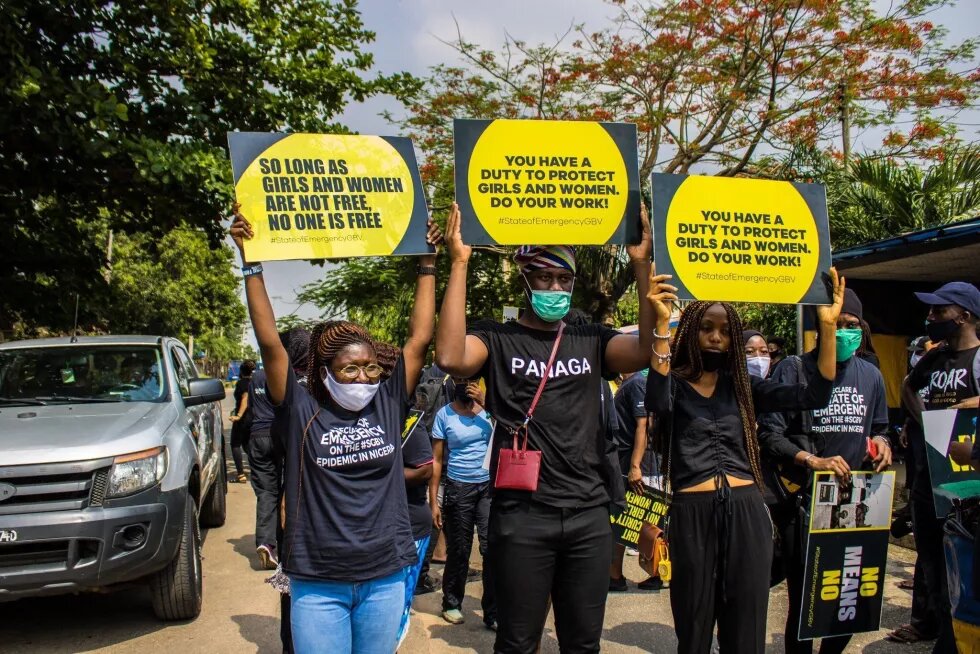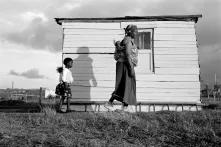
With the transition from military rule to democracy in 1999, Nigerian women hoped that their voices would finally be heard and their demands for an equal share in political participation fulfilled. Yet today’s generation of young women and feminists are confronted with challenges similar to their older sisters. Two decades later, violence against women is as rampant as ever and, in the 2019 elections, only 62 women were elected to serve in the federal and state assemblies.

Nkoyo Toyo is a Nigerian politician, lawyer and advocate for development, with a focus on human rights and gender equality. She is a former Nigerian ambassador to Ethiopia and the founder of Gender and Development Action in Nigeria. OluTimehin Adegbeye is a Nigerian queer feminist advocate who works at the intersection of human rights, inclusion and social justice. Monika Umunna, programme coordinator at Heinrich Böll Foundation’s Abuja office, spoke to them to explore Nigerian feminism and gender rights activism then and now, and how the different generations assess each other’s struggles and achievements.
What influences have shaped your understanding of feminism in Nigeria and of you as a feminist?
Nkoyo Toyo: I am a child of the civil war fought between the Nigerian government and the secessionist state of Biafra. Having witnessed the atrocities of the war at the age of six years, I kept on raising, throughout my life, the questions on why the Biafran War happened, and why voiceless people remain voiceless. During my student years at Ahmadu Bello University in Kano, Marxist and socialist ideas raised huge questions that we all wrestled with. Led by human rights activist Ayesha Imam, we started to disaggregate the dominant narrative about the subjugation of people and the class struggle in order to find space for the role of women in society in this debate. So, I am a product of that time and environment, which helped me to discern and understand the exclusion of people and issues of marginalisation, discrimination and inequality.
Another defining moment for me and for the Nigerian women’s movement was the transition to democracy in 1999. At the time, we had already developed a political agenda for Nigerian women and worked towards domesticating the Beijing Agenda1. We were part of the struggles for a return to democratic rule but unfortunately our voices, like many other voices from civil society, were ignored during the transition period. The male-dominated political mainstream reinforced their patriarchal narrative, which had defined the post-independence character of Nigeria and unsurprisingly took over the transition process and used the Constitution to uphold their values and privileges.
As feminists and rights advocates asking for considerable transformation of the governance system, we found ourselves left out of the conversation and decision-making at this defining moment. Although, over the years, women achieved some success by domesticating international women’s rights treaties2, the main challenge remained to grow our numbers and carry our issues into mainstream politics. That’s why I decided to get into politics in 2003 and be part of changing the narrative from within.
OluTimehin Adegbeye: I define myself as a queer feminist writer, public speaker and community builder, and work through the use of social media, targeting young women and queer people. My interest is in the intersections between more obvious feminist struggles and other, less obvious social issues. How can the fight against patriarchy include class, sexuality and access to housing, knowing that the source of the problem is the sexism, misogyny and patriarchal indoctrination of our society?
For me and many other feminists of my generation, the political system in Nigeria is not at the forefront of our minds. We grew up at a time when the work of crippling the public political education was already complete. By the time I was getting my education, history had been taken out of our curriculum, so I only learned about the Biafran War and the transition outside of school. Today, we are thinking more about the violence we have to navigate on a daily basis. We do not necessarily understand that today’s power dynamics are the result of the conservative power dynamics that were institutionalised in 1999. We do not necessarily make the connection between Nigeria’s militarised history and the dysfunctional relationship to power we experience in Nigeria today, where there is so much impunity in committing acts of violence. We do not necessarily trace back the intimate violence women experience today to the root causes that created this cultural impunity, which is the civil war that laid the foundation for violence and impunity. Feminists of my generation are now confronted with the question of why violence rules our daily lives.
How would you assess the state of Nigeria’s feminist movement in your time?
NT: When I got involved with Women in Nigeria (WIN), which was founded in 1982 at Ahmadu Bello University and was the most vocal and organised feminist movement at that time, it had space for different kinds of ideological views.
For example, at first, we were very quick in condemning women like Mrs Babangida – the wife of General [Ibrahim Badamasi] Babangida, Nigeria‘s head of state from 1985 to 1993 – for using her position to galvanise people through her Better Life for Rural Women Programme.3 Over time, we came to realise that it was a great platform for bringing women from the most remote areas together to enable them to challenge those unspoken issues usually locked within their cultural context.
WIN at that time was also open to men, whom we accepted because they believed in the same things and were true feminists. Feminism was much more than being a woman. But men started to dominate the way we organised ourselves and wanted to teach us how to run the organisation. With these power struggles over the management of the organisation, the dynamics changed and women withdrew, and so WIN became a shadow of itself.
The greatest challenges came when we started setting up our individual NGOs. Where would we get the resources to do the things we wanted to do with WIN, which at the time depended solely on its small membership fees? In the end, the NGO work took quite a lot of energy from us. We were no longer accountable to ourselves; we were now accountable to development partners and international donors. We started to structure our narrative to fit into “development” discourse. We lost the energy that came from being an independent movement. We even started to fight against each other for funding while we should have paid attention to better understanding the intersections between those NGOs directly challenging patriarchy and demanding equal rights and NGOs less willing to challenge the status quo but committedto alleviating the negative impacts of patriarchy on women through development.
Nowadays, many women engage in different ways to challenge the same structures. They are calling patriarchy out and asking people to be answerable. But the women’s movement today is not as large as it used to be because many spaces have been taken back by the power-brokers within the political circles.
Looking at what we have been able to do over the last couple of months, regarding Covid-19 and gender-based violence, there was again immense energy and power, just like when Maryam Babangida created a major force of change in the 1990s. But despite all the advocacy and programmes towards mainstreaming women’s rights and equality, government policies and actions are nowadays slow, if not almost non-existent.
OA: In many ways, it feels as if there is a movement among young feminists, but I can feel a disconnect between the younger and the older generations. We seem to be reinventing the wheel although we do not have to, as the legacy has already been created. Although I heard about the Nigerian Feminist Forum a few years ago, I still don’t know how to become a member.4 Many feminists of my generation in Nigeria only celebrate feminists who live in the US, and they don’t know what WIN is. We do not have an analysis or a framework for connecting our ideological feminist positions to the realities of rural women like Babangida’s campaign did.
We understand the intellectual underpinnings of feminism and use it to organise protests against very specific issues, like sexual violence, but very rarely does it branch out into other aspects in the way women in the 1980s and 1990s were organising and making class-based demands for access to rights. Today, it is more about individualistic desires for safety, freedom and power in a conservative Nigeria. For young feminists, sexual violence is absolutely the central issue. Class-based solidarity and entering into electoral politics are not the main concerns among the young feminists.
It was only when I worked with an NGO on urban evictions that I came into contact with intersectionality in real time. It became apparent to me how income poverty complicates questions of gender experiences, where gender-based violence is just one out of many pressing issues and might not take priority. And these pressing issues are not at the forefront for young feminists, including myself. I have no concept of how that would actually work, how young feminists could approach the community-building, mobilisation and activation of women. We just don’t have the framework, we don’t have the understanding, and we don’t have the political orientation to enable us to mobilise to such an extent. We are preoccupied with how we survive Nigerian patriarchy.
Religion and queer rights have become much more prominent factors in the conversation about womanhood, women’s rights and gender identity. What has been the impact of this on the feminist movement?
OA: Absolutely, I agree with you. Being a queer Nigerian, I can’t separate my queerness from my womanhood. The question of ideological integration is important for me, and so, if I show up in the feminist movement, I would do so as a queer feminist. And for many Nigerian feminists, that is unacceptable. Yet there are many young people coming to feminism because of their sexuality as it offers the opportunity to dismantle the social structures that create marginalisation and oppression – not just for heterosexual women but for queer people as well.
That ideological friction is much more apparent now than it would have been during the Beijing movement. At the time, the movement was very clearly focused on women’s rights – sexuality wasn’t even on the table – and it was about access to rights and access to resources without the complexity of sexuality.5 Now that sexuality has been recriminalised in Nigeria with the Same Sex Marriage (Prohibition) Act of 2013, it has come to the forefront in a way that it didn’t before.
For queer feminists, this raises the question: should I dedicate my radical energy to a movement that only wants my womanhood and does not want my queerness? I would not even be able to rely on the women’s rights movement to fight for me in the way we have been fighting for women, given that women’s rights organisations didn’t fight against the Act in the way they usually would with “feminist” issues. So, should I even bother to explain my perspective to them? The ideological tension is very apparent now, in a way it would not have been before.
NT: You make a good point here about ideological tension in the women’s movement in Nigeria. Concerns for women that come into the mainstream are also radical in their own terms, but they may not be as radical to the point you are talking about. You must also bear in mind that people don’t change society overnight. You do not lose anything by keeping your womanhood and queerness separately because when you get into the political and public space with both, you will have to fight too many wars and your personal identity begins to fight the other part of what you are trying to achieve.
OA: My personal struggle is also political. It would mean to be in a movement that explicitly does not see you, and that your experiences do not result in the same political demands and consequences. Maybe particularly because of the recriminalisation of queerness in Nigeria, it will be impossible for me to say, “Let’s put this one on the side and focus on the other issue.” It is possible for me to campaign on sexual violence as a Nigerian woman, yes – but, as a queer woman, I face forces that a heterosexual Nigerian woman doesn’t have to face. Separating the two is untenable, and yet I don’t know how the two can be reconciled. There is no preparedness in the Nigerian feminist movement to move towards the understanding that there is no coherent way of separating the two for people who are coming to feminism because of their queerness.
NT: I can’t challenge you on that. But there is so much work to be done in the traditional context in which feminism is understood in Nigeria. The more space we gain on that front, the more space we can open up to gain for queerness. My point is that you need a bit more strategic thinking. You want to be at the table where you can discuss the things you believe in. We can liberate women only from a position of power, that’s why I am still in the political sphere. It’s a chicken-and-egg situation but it’s also a personal choice and that’s why I say there are many strings of feminism, one mustn’t over-cloud the other. The argument in the end is about our liberation, the liberation of spaces and opportunities and access.
Given some of your concerns, a community of young feminists should come together to start an exchange with women active in the political sphere who end up being in positions where laws are made. You need to have access to the spaces where the criminalisation of queerness, for example, is happening and start to find allies. It’s a long journey. I belong to a platform called Women for Women Community, where we mentor younger women to fight for changes in the society, holding hands and becoming a strong force.
We in the older generation are not so good with social media but we should draw from the expertise of the younger generation. We should also start to share the stories of our past and write them down so that the young ones can find their own identities within these stories and find strength to engage with that. There has to be a mentoring process on how to talk to a political space that is made up of men and women who have been, or who are in, power positions. We need to bring them out of their comfort zones, so that they gradually get to hear the personal stories and concerns. You first of all need to know your allies and how to face people who do not support you.
OA: Addressing this disconnect is key. We are doing a lot of things we shouldn’t do because they have already been done. The opportunity to build on what you have already done is extremely appealing to me. There are many young ones well connected through their work with NGOs, but we also have to bring in those who are outside the NGO space, who are creating communities and conversations online through social media. We need to establish relationships with older feminists.
-
The Beijing Declaration and Platform for Action was adopted by the Fourth World Conference on Women, which was convened by the UN in Beijing, China in September 1995.
-
The Child Rights Act was passed into law in Nigeria in 2003. By October 2020, however, 11 of the country’s 36 states had yet to domesticate it into state law. Domestication efforts on CEDAW, the 1979 Convention on the Elimination of all Forms of Discrimination Against Women, began in 2006, but up to today, issues of reproductive rights meet resistance among a number of lawmakers. Nevertheless, important policies like the Gender Policy and programmes like “Girls Not Brides“ came from these domestication struggles.
-
The Better Life for Rural Women Programme was established in 1987 by Maryam Babangida. It worked with rural women to increase their access to healthcare and income-generating opportunities and to include women’s needs in national development plans. It led to the establishment of the National Commission of Women which was later upgraded to the Ministry of Women Affairs. The programme drew criticism because its funding through government allocations was unconstitutional, it lacked transparency and accountability, and it was feared that it would be misused as a political tool by the military dictator.
-
The Nigerian Feminist Forum (https://www.facebook.com/NigerianFeministForum) started in 2006 as an offspring of the African Feminist Forum. It organises biannual conferences that bring together Nigerian feminist thinkers and women’s rights activists, although it uses a rather low-key approach.
-
It is, however, important to note that Bev Ditsie, a South African queer rights activist, made a groundbreaking speech at the Conference on Women in Beijing in 1995, insisting that every woman has the right to determine her sexuality free of discrimination and oppression. See https://www.theguardian.com/society/2020/aug/20/beverley-ditsie-the-south-african-woman-who-helped-liberate-lesbians-everywhere.



